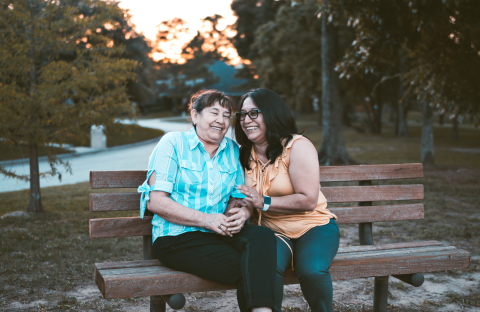Reducing Harmful Effects of Opioid Use Through Proactive Education

Communities in New Hampshire have been grappling with the burden of opioid misuse and overdoses for years. While many programs exist to help those impacted by substance use disorder connect to treatment and recovery services, there is also promise in the idea of addressing the problem before it even starts. Thanks to a nearly million-dollar grant from the Department of Health and Human Services Substance Abuse and Mental Health Services Administration (SAMHSA), that’s the angle UNH Extension is taking with a new initiative focused on education and resource creation funded by the SAMHSA Rural Opioid Technical Assistance Program.
UNH Extension Youth and Family Resiliency State Specialist Kendra Lewis explains that the initiative includes three major elements. The first part involves training people across the state in the Chronic Pain Self-Management Program. The second entails collaborating with The Partnership at Drug Free New Hampshire to create new educational videos and content that will be posted online. The final piece is the implementation of Extension of Community Health Care (ECHO), a course that provides medical professionals and community partners with resources to support individuals with chronic pain.
Lewis says all three elements are critical to addressing the Granite State’s opioid crisis. “New Hampshire has one of the highest drug- related death rates in the nation,” she says. “The opioid epidemic is not just an urban issue, it is a big concern in rural areas, which are highly concentrated with older adult residents dealing with pain on a daily basis.”
Collaborating with Partners to Create Change
Lewis and UNH Extension Youth and Family Resiliency Field Specialist Melissa Lee have spearheaded this initiative with the help of six other partner organizations in the Granite State. Many of these groups are building on existing programming, while others are just getting programs off the ground.

Lee notes that the State Opioid Response (SOR) work has focused primarily on treatment and recovery infrastructure with the development of The Doorway network. “Through our collaboration with the SOR team and other partners in New Hampshire, we’re helping to fill a need by expanding opioid prevention education and resources. I’m very passionate because I’ve been facilitating self-management education and prevention activities for years in other roles and I saw the opportunity for Extension to use our infrastructure and resources to help lead this work,” she says. “It complements so many of the things that our healthy living educators are out doing. There’s a need for more community-based education and we now have the ability to help meet that need.”
The Chronic Pain Self-Management program is an evidence-based program first established at Stanford University. Extension staff and members of the community have been trained to facilitate these courses, led by Southern New Hampshire Area Health Education Center, which has been working on self-management programs since 2009. “It’s great to have Cooperative Extension involved because they’re adding this outreach capacity that we don’t currently have, given our current funding,” says center director Paula Smith. “They’ve added some great energy and momentum to the outreach aspects of the program.”
The free courses are open to anyone in New Hampshire suffering from chronic pain and are run in six sessions. The courses teach people how to manage pain by eating healthy, being physically active and using the mind to handle symptoms. The message, Lee says, is not that people can’t take opioids but rather that there are alternative low-risk strategies to consider. “We want people to feel more empowered and informed that they have a choice and there’s things that they can do to keep themselves, their family and their community safe from the potential harmful side effects of opioid use,” she says.
Through these courses, participants can learn problem-solving strategies to deal with fatigue, pain, frustration, isolation and poor sleep. They can experience physical activities for maintaining strength, flexibility and endurance. They also receive tips on improving nutrition, enhancing communication with family and healthcare providers and understanding appropriate use of medication.
The ECHO program is originally run out of New Mexico, but Lewis and Lee are teaming up with the UNH Institute for Health Policy and Practice, which is familiar with leading these programs, to implement it in New Hampshire. By educating medical professionals and community organizations on chronic pain resources and sharing case studies, the hope is to create networks of support and link those who can benefit with low-risk strategies for chronic pain management.
What Comes Next?
This fall, Extension will co-host a conference with the Partnership at Drug Free N.H. focused on prevention efforts in New Hampshire. Organizers hope to showcase the power of the partnership in prevention and that everyone has a role to play in keeping our communities healthy.
“Through our efforts, we’re looking upstream to help prevent opioid misuse from happening,” says Lee. “The messaging that we’re creating — the empowerment around opioid prevention — is applicable to so many other risk factors that New Hampshire youth, families and communities are facing.”
For now, there is much work to be done, and Lee and Lewis are grateful for the support they have received throughout the process. The grant is set to end in August 2022, but the group is exploring how Extension can continue to engage with this work for a long time to come.
Chronic pain self management program